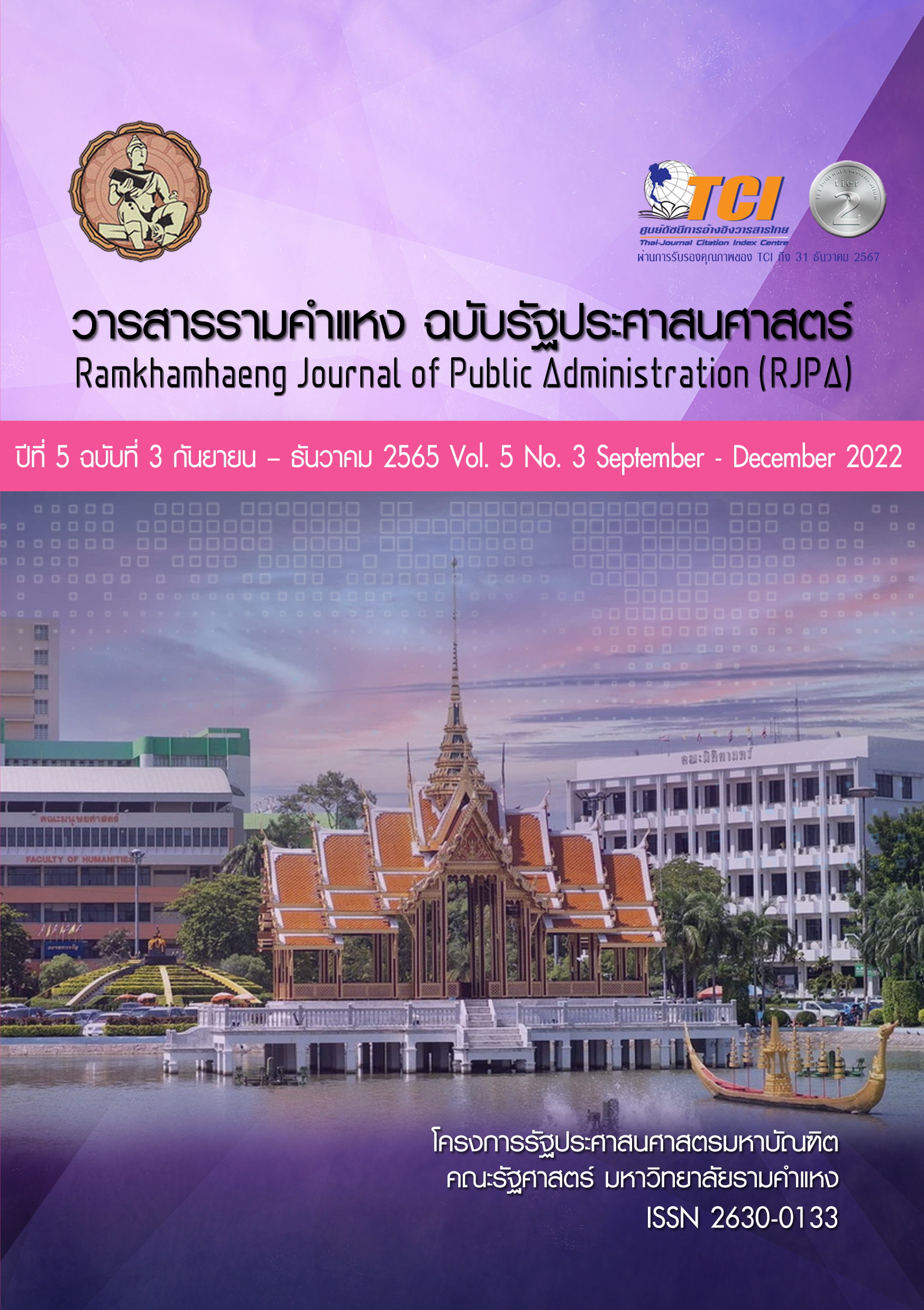Power maintenance of Thai political elites from 1979-2019
Keywords:
political elites, democratic regime, authoritarian-military regimeAbstract
In this research, the researcher aim 1) to study power maintenance of Thai political elites under democratic and authoritarian-military regime from 1979-2019 and 2) to examine which regime is conducive to maintain their powers. This research employed a qualitative research method, the data was collected from academic documents and then analyzed by using a theory of triangulation.
Findings are as follows; the role of political elites (bureaucrats and military, aristocrats and scholars, politicians and capitalists) can be seen in all governments even if the regime was changed but their political role remains. However, their roles of power are different depending on the current regime and the constitutional provisions. Moreover, even though the regimes were changed, all groups of the political elites still have political roles that can be explained by their ability to adapt to both regimes.
References
กนกพร เขมเตชิษฐ์. (2557). บทบาทของยิ่งลักษณ์ ชินวัตรในฐานะนายกรัฐมนตรีของไทย (2554-2556). ดุษฎีนิพนธ์ปรัชญาดุษฎีบัณฑิต คณะรัฐศาสตร์ สาขาการเมือง, มหาวิทยาลัยรามคำแหง.
คริส เบเกอร์ และผาสุก พงษ์ไพจิตร. (2559). ประวัติศาสตร์ไทยร่วมสมัย (พิมพ์ครั้งที่ 5). กรุงเทพมหานคร: สำนักพิมพ์มติชน.
แถลงการณ์ของคณะปฏิรูปการปกครองแผ่นดิน. (2519). ราชกิจจานุเบกษา, 93(120), 1-4.
ธำรงศักดิ์ เพชรเลิศอนันต์. (2561). “ข้ออ้าง” การปฏิวัติ-รัฐประหารในการเมืองไทยสมัยใหม่ (พิมพ์ครั้งที่ 2). กรุงเทพฯ: มูลนิธิโครงการตำราสังคมศาสตร์และมนุษยศาสตร์.
นรนิติ เศรษฐบุตร และนิยม รัฐอมฤต. (2554). คำสั่งและประกาศของคณะ รสช. กับการเมืองไทย. สถาบันพระปกเกล้า. ค้นเมื่อ 7 มีนาคม 2563 จาก http://wiki.kpi.ac.th/index.php?title=คำสั่งและประกาศของคณะ_รสช._กับการเมืองไทย
บีบีซีไทย. (2562). เลือกตั้ง 2562: สหรัฐฯ-มูลนิธิองค์กรกลางเพื่อประชาธิปไตย เรียกร้อง กกต. โปร่งใส-เป็นธรรม. ค้นเมื่อ 19 พฤษภาคม 2563, จากhttps://www.bbc.com/thai/international-47707474
มติชนออนไลน์. (2562). บทนำ: 5 ปีรัฐประหาร. ค้นเมื่อ 19 พฤษภาคม 2563, จาก https://www.matichon.co.th/article/news_1505796
พรภิรมณ์ เชียงกูล (ม.ป.ป.). เหตุการณ์พฤษภาทมิฬ 2535: วิเคราะห์ในมิติทางประวัติศาสตร์. ภาควิชาประวัติศาสตร์ สังคมศาสตร์, มหาวิทยาลัยเกษตรศาสตร์.
ยุทธศาสตร์ หน่อแก้ว. (2563). รัฐธรรมนูญฉบับประชาชนกับการผลักดันแนวทางประชานิยม ภายใต้การสนับสนุนรัฐบาลของชนชั้นรากหญ้าในสังคม. วารสารนิติ รัฐกิจและสังคมศาสตร์. 4(1), 62-65.
สยามรัฐออนไลน์. (2562). ‘เลื่อนลือกตั้ง’ ในมิติ ‘ประชาชน’. ค้นเมื่อ 19 พฤษภาคม 2563. จาก https://siamrath.co.th/n/61385
เสน่ห์ จามริก. (2549). การเมืองไทยกับการพัฒนารัฐธรรมนูญ (พิมพ์ครั้งที่ 3). กรุงเทพฯ: โรงพิมพ์เรือนแก้ว.
Fraenkel, E. (1941). The Dual State: A Contribution to the Theory of Dictatorship. New York: Oxford University Press.
Merieau, E. (2016). Thailand’s Deep State, Royal Power and the Constitutional Court (1977-2016). Journal of Contemporary Asia, 46(3), 445-466.
McCargo, D., & Pathmanand, U. (2005). The Thaksinization of Thailand. Thailand and European Union: NIAS Press.
Chai-Anan Samudavanija. (1987). “Democracy in Thailand : A Case of a Stable Semi-democracy Regime”. World Affairs: SAGE Publication, 150(1). pp. 31-41.
Riggs, F. (1966). Thailand the modernization of bureaucratic polity. Honnolulu: East-West Center Press
Downloads
Published
How to Cite
License
Copyright (c) 2025 จุฑามาศ สว่างภณกาญจนา, เกรียงชัย ปึงประวัติ, นิพนธ์ โซะเฮง , บุญเกียรติ การะเวกพันธุ์

This work is licensed under a Creative Commons Attribution-NonCommercial-NoDerivatives 4.0 International License.



